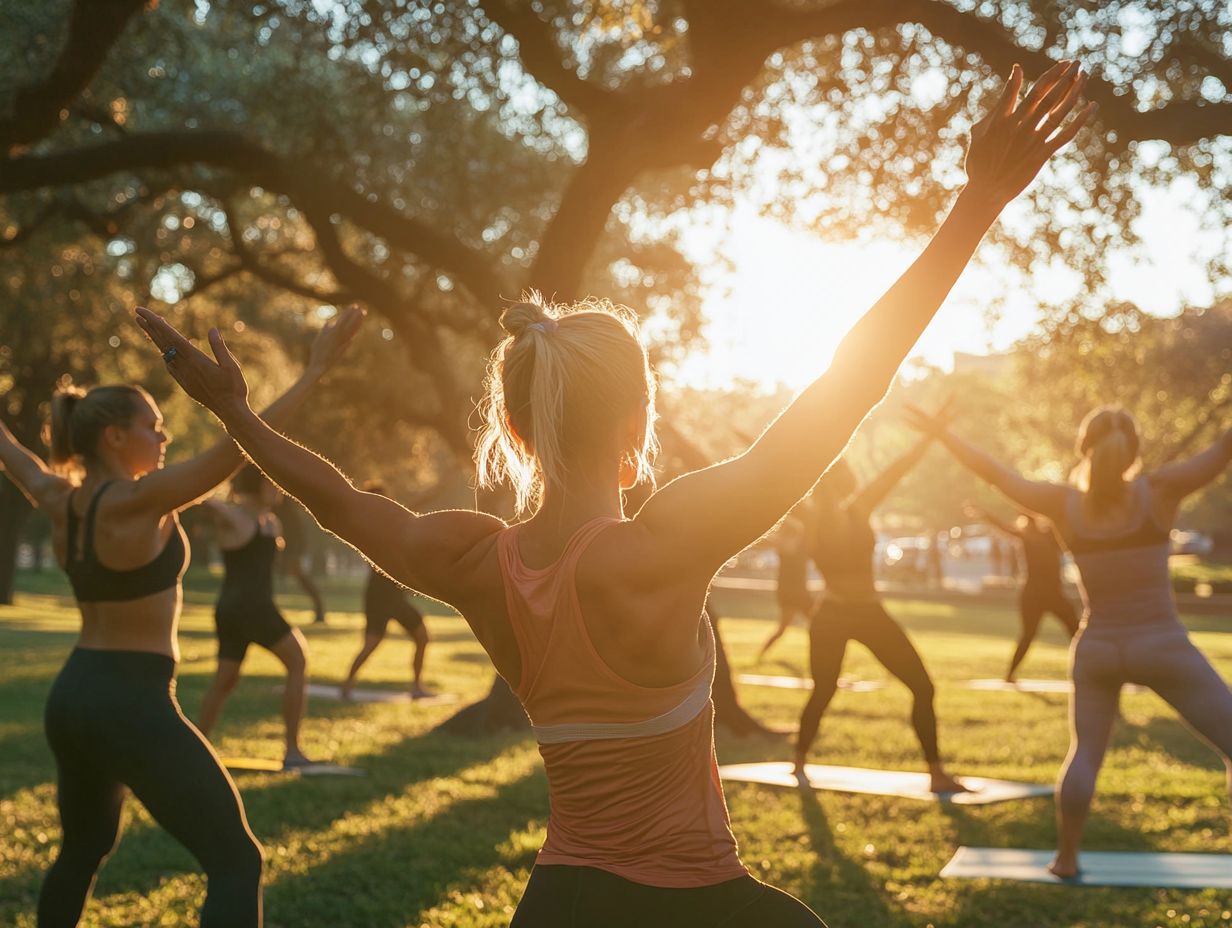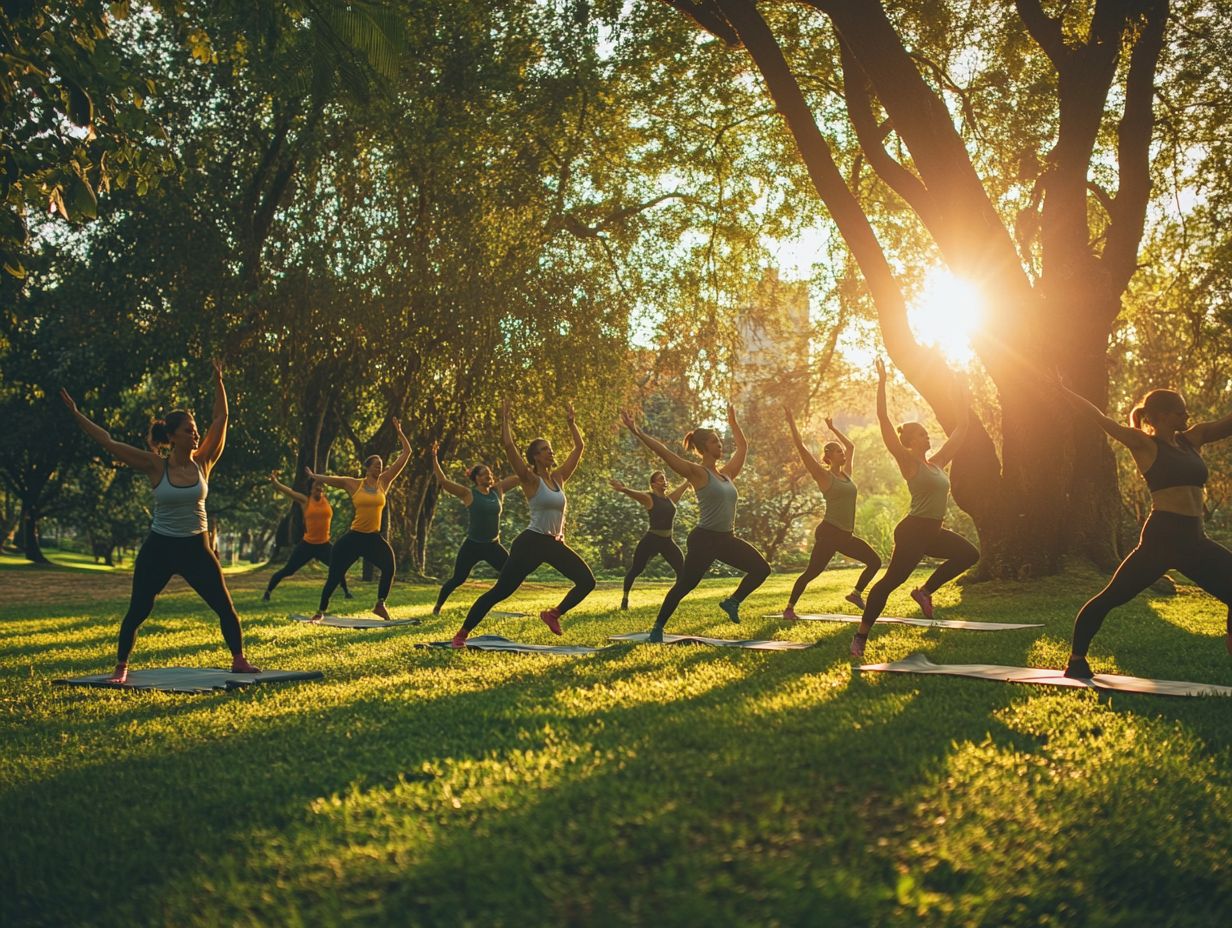73. 6 Benefits of Integrative Health for Athletes
Athletes are always on the lookout for innovative ways to enhance their performance and well-being. A holistic health approach presents a way that can truly make a difference.
This piece delves into six key benefits of holistic health, ranging from improved performance and recovery to a deeper mind-body connection. You ll learn about personalized treatment plans, dispel common misconceptions, and explore how easily you can incorporate these practices into your training regimen.
Discover how embracing holistic health can elevate your athletic journey and bolster your overall wellness!
Contents
- Key Takeaways:
- 1. Boost Your Performance and Recovery
- 2. Reduce Your Risk of Injury
- 3. Improve Your Mental Focus and Clarity
- 4. Promotes Overall Well-Being
- 5. Integrates Mind and Body Connection
- Tailored Treatment Plans for Athletes
- What Is Integrative Health and How Does It Benefit Athletes?
- What Are the Key Components of Integrative Health for Athletes?
- How Can Integrative Health Help with Specific Injuries?
- What Are the Different Types of Integrative Treatments Available for Athletes?
- How Can Athletes Incorporate Integrative Health into Their Training Regimen?
- What Are the Common Misconceptions About Integrative Health for Athletes?
- Frequently Asked Questions
- What is integrative health for athletes and how does it differ from traditional medicine?
- What are the 6 benefits of integrative health for athletes?
- How does integrative health help improve athletic performance?
- How does integrative health prevent injuries in athletes?
- Can integrative health help athletes recover from injuries faster?
- How does integrative health benefit an athlete’s mental health and well-being?
Key Takeaways:

- Holistic health improves athlete performance and recovery.
- It reduces the risk of injury.
- Holistic health supports mental clarity.
- It promotes overall well-being.
- It strengthens the mind-body connection.
1. Boost Your Performance and Recovery
Holistic health is essential for improving your performance and recovery as an athlete. By embracing complementary health methods like therapeutic exercise, Tai Chi, and personalized exercise plans, you can optimize your physical fitness while promoting long-term wellness.
This approach goes beyond just the physical aspects of training; it also considers your mental health, ensuring effective recovery and peak performance. Practices such as Tai Chi and structured breathing exercises have gained recognition for facilitating both physical recovery and mental clarity.
Research from the National Center for Complementary and Integrative Health shows that Tai Chi can improve flexibility and balance key factors in injury prevention while reducing stress. The American College of Rheumatology highlights that breathing techniques can lower anxiety levels and foster a meditative state that supports recovery.
By weaving these methods into your routine, you can accelerate muscle recuperation and cultivate a focused mindset, ultimately leading to enhanced performance outcomes over time.
2. Reduce Your Risk of Injury
Incorporating simple exercises that help keep your body moving and healthy can significantly reduce your risk of injury while enhancing your overall physical fitness.
These holistic health techniques not only help prevent injuries but also bolster your body’s resilience against various health conditions, contributing to a well-rounded athletic performance.
Research indicates that around 30% of athletes grapple with chronic pain from recurring injuries, and movement therapy has proven effective in alleviating this concern.
Methods like therapeutic touch promote relaxation, aid in muscle recovery, and enhance flexibility, playing a crucial role in injury prevention.
A study published in the Journal of Physical Therapy Science reveals that athletes who regularly engage in movement therapy experience a remarkable 40% reduction in injury occurrences compared to their peers who do not.
These practices can bridge health disparities, offering accessible pain relief options that enable you to sustain your athletic pursuits and overall well-being.
3. Improve Your Mental Focus and Clarity
Mind-body practices such as yoga, Tai Chi, and focused breathing exercises are proven methods to enhance your mental focus and clarity while tackling anxiety disorders and boosting athletic performance.
These holistic health approaches not only promote better mental well-being but also ensure you are mentally equipped to confront competitive challenges.
Recent research underscores the importance of these practices, particularly breathing exercises, in managing anxiety. Studies supported by the World Health Organization reveal that incorporating deep breathing techniques can significantly reduce cortisol levels often dubbed the stress hormone.
Participants have reported improvements in concentration and a marked decrease in anxious feelings after engaging in structured breathing routines. The combination of body movement and mindful breathing creates an atmosphere ripe for mental clarity, enabling you to excel in competitive situations while building emotional resilience.
This holistic approach to mental well-being is increasingly regarded as essential for athletes like you, who are striving for excellence.
Take charge of your health and performance! Start today to experience the benefits firsthand!
4. Promotes Overall Well-Being
Integrative health elevates your well-being by seamlessly blending physical fitness, mental health practices, and strategies that promote long-term wellness.
By addressing both physical and psychological health, you can cultivate a balanced lifestyle that enhances your performance and enriches your quality of life.
This holistic approach ensures that you focus not just on strength and endurance; you also nurture your mental resilience through mindfulness and effective stress management techniques.
For example, initiatives like the ‘Mental Health in Sports’ campaign help you prioritize your mental well-being with workshops that offer valuable coping strategies and emotional support.
Programs that include yoga or tai chi alongside traditional fitness routines show significant improvements in both physical capacity and psychological health.
By nurturing a supportive environment that embraces various strategies, you can foster a deeper connection to your health, leading to sustainable practices that enhance your daily life.
5. Integrates Mind and Body Connection

The integration of mind and body through movement therapy and Tai Chi is a cornerstone of integrative health. This connection significantly enhances your quality of life as an athlete while promoting health equity.
By fostering this connection, you can manage stress more effectively, boost performance, and enhance overall health resilience.
This approach invites you to explore how physical movement intertwines with emotional well-being, helping you navigate competition pressures with heightened focus and tranquility.
By tailoring practices like yoga or Dance/Movement Therapy to your specific challenges, you can experience profound improvements in both performance and daily life.
As you engage more deeply with your body, you sharpen your physical skills and cultivate a sense of presence and mindfulness essential elements for achieving long-term success and balance in your athletic journey.
Tailored Treatment Plans for Athletes
Creating personalized treatment plans that incorporate exercise prescriptions and complementary health methods is essential for addressing the varied needs of athletes, including children and those managing chronic pain. This tailored approach ensures you recover quickly and effectively!
By thoughtfully assessing your unique physical condition, injury history, and performance goals, healthcare professionals can craft exercise programs that minimize risks and foster overall well-being.
Consider a young soccer player with recurrent knee pain. A customized treatment plan that included strength training, flexibility exercises, and functional movement patterns led to improved stability and reduced discomfort.
Then there’s a veteran marathon runner diagnosed with tendinitis. His personalized regimen focused on low-impact activities and gradual intensity adjustments, enabling him to return to competitive form while safeguarding his long-term health.
Explore these integrative practices and discover how they can transform your athletic experience!
What Is Integrative Health and How Does It Benefit Athletes?
Integrative health is an exciting way to boost your athletic performance and overall well-being. It combines different health strategies, focusing on both physical fitness and mental health to help you perform better and maintain lasting wellness.
By blending various methods like movement therapy and therapeutic exercise, you can create a more balanced state of health. This approach ultimately enhances your performance and improves your quality of life.
This methodology showcases the strong connection between traditional medicine and alternative therapies. It recognizes that achieving optimal athletic performance is not just about hard training; mental resilience and emotional health are equally important.
Research from reputable organizations, such as the National Institutes of Health and the National Center for Complementary and Integrative Health, emphasizes that practices like mindfulness meditation, acupuncture, and nutrition counseling can be crucial in helping athletes manage stress, speed up injury recovery, and boost energy levels.
Incorporating elements like massage therapy or yoga into your routine can be a game changer for athletes! These practices enhance flexibility and support muscle recovery, fostering a complete wellness lifestyle that allows you to consistently perform at your peak.
What Are the Key Components of Integrative Health for Athletes?
Key components of integrative health for athletes include a variety of methods. These encompass movement therapy, mental health practices, and customized physical fitness programs that address chronic pain while improving overall performance.
These elements work together to promote better health outcomes and enhance athletic success. For example, engaging in movement therapy like yoga or Pilates not only improves flexibility and strength but also plays an important role in preventing injuries by enhancing body awareness.
Mental health practices, such as mindfulness and visualization techniques, can reduce anxiety and improve focus, which is crucial during competitions. Tailored fitness programs, designed to meet your specific needs as an athlete recovering from injuries, help you gradually build endurance and strength.
Many professional athletes, including Olympians, have shared how these complete approaches have contributed to their success, highlighting the importance of understanding both their physical and mental health needs.
How Can Integrative Health Help with Specific Injuries?
Integrative health approaches, especially therapeutic exercise and personalized exercise plans, are vital for your recovery journey from specific injuries. These methods also address chronic pain and mental health concerns.
By focusing on your unique needs, these strategies create a more effective recovery process and enhance performance. This tailored approach is especially beneficial for individuals dealing with common sports injuries, like ankle sprains or tendonitis.
For instance, therapeutic exercises such as balance training and eccentric loading a type of strength training that involves lengthening the muscle under tension can significantly improve strength and flexibility, speeding up healing. Incorporating mental health strategies like visualization and mindfulness can also help you face the psychological challenges of recovery.
By concentrating on both your physical and emotional well-being, you can shorten your rehabilitation time and return to your sport with renewed confidence and resilience.
Ready to elevate your game? Explore integrative health strategies today!
What Are the Different Types of Integrative Treatments Available for Athletes?

As an athlete, various health methods are at your disposal. These include movement therapy, Tai Chi, and other complementary health strategies that address both your physical and behavioral health. These treatments can supercharge your performance and help you recover faster!
Practices like yoga and Pilates significantly enhance your flexibility and core strength, which are vital for maintaining stability during your athletic endeavors.
Mindfulness practices such as meditation are invaluable for managing stress and sharpening your mental focus, both essential for reaching peak performance.
The National Center for Complementary and Integrative Health emphasizes that these holistic approaches not only support physical recovery but also cultivate mental resilience.
By incorporating these diverse therapies into your routine, you can create a comprehensive wellness regimen that boosts both your physical capabilities and psychological well-being.
How Can Athletes Incorporate Integrative Health into Their Training Regimen?
You can effectively integrate holistic health into your training by using exercise prescriptions, engaging in movement therapy, and prioritizing mental health practices designed to promote long-term wellness. This comprehensive approach ensures that you re not just physically prepared but also mentally resilient.
By establishing a consistent routine that includes scheduled workouts, mindfulness sessions, and adequate recovery periods, you enhance both your performance and overall well-being.
For instance, incorporating yoga or meditation into your daily training can sharpen your focus while alleviating anxiety. When you follow nutritional guidelines alongside these practices, you often notice improvements in your energy levels and stamina.
To maximize effectiveness, set realistic goals and track your progress. This creates a feedback loop that fosters lasting habits. Remember, consistency is key; just like daily workouts build physical strength, regular health practices bolster your mental and emotional resilience, ultimately paving the way for success in your sporting endeavors.
What Are the Common Misconceptions About Integrative Health for Athletes?
Many misunderstandings about integrative health stem from its holistic approach and effectiveness in addressing both physical fitness and mental health concerns. These misconceptions can create health disparities and impede your optimal athletic performance.
For instance, you might think that integrative health focuses solely on alternative therapies. However, it actually combines conventional medicine with complementary treatments to enhance your athletic performance by nurturing your overall well-being physically, emotionally, and socially.
While traditional techniques like strength training and conditioning are undeniably vital, incorporating practices such as mindfulness, nutrition, and recovery strategies offers a more balanced regimen.
Misunderstandings about integrative health not only fuel skepticism but can also prevent you from taking advantage of a multi-faceted approach that honors both your body and mind, ultimately optimizing your performance and resilience.
Frequently Asked Questions
What is integrative health for athletes and how does it differ from traditional medicine?
Integrative health for athletes is a holistic approach that combines traditional medicine with complementary and alternative practices. It looks at the whole person, not just specific injuries, to optimize physical and mental well-being.
Unlike traditional medicine, which often focuses solely on treating specific injuries or illnesses, integrative health considers factors such as nutrition, exercise, and stress management to promote overall health.
What are the 6 benefits of integrative health for athletes?

Discover how integrative health can supercharge your athletic journey with these 6 incredible benefits: improved performance, injury prevention, faster recovery, better mental health, increased energy, and enhanced overall well-being.
How does integrative health help improve athletic performance?
Integrative health boosts athletic performance by tackling main problems like fatigue, stress, and pain.
A mix of treatments, such as acupuncture (inserting thin needles into the skin), massage, and nutrition counseling, optimizes both physical and mental health for better results.
How does integrative health prevent injuries in athletes?
Integrative health prevents injuries by promoting proper body alignment and improving flexibility.
By addressing potential issues early, athletes stay healthy and perform at their best.
Can integrative health help athletes recover from injuries faster?
Yes! Integrative health dramatically speeds up recovery after injuries.
Treatments like massage and physical therapy reduce pain and inflammation, improve circulation, and enhance healing.
These techniques also fix underlying weaknesses, preventing future injuries.
How does integrative health benefit an athlete’s mental health and well-being?
Integrative health boosts mental health by reducing stress and anxiety while improving sleep.
Techniques like meditation, yoga, and mindfulness help athletes manage competition pressures, leading to a healthier and happier mind and body.






